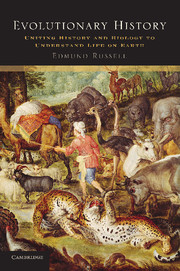Book contents
- Frontmatter
- Contents
- Figures
- Tables
- Preface
- Acknowledgments
- 1 Matters of Life and Death
- 2 Evolution's Visible Hands
- 3 Hunting and Fishing
- 4 Eradication
- 5 Altering Environments
- 6 Evolution Revolution
- 7 Intentional Evolution
- 8 Coevolution
- 9 Evolution of the Industrial Revolution
- 10 History of Technology
- 11 Environmental History
- 12 Conclusion
- Note on Sources
- Glossary
- Notes
- Index
Preface
Published online by Cambridge University Press: 05 June 2012
- Frontmatter
- Contents
- Figures
- Tables
- Preface
- Acknowledgments
- 1 Matters of Life and Death
- 2 Evolution's Visible Hands
- 3 Hunting and Fishing
- 4 Eradication
- 5 Altering Environments
- 6 Evolution Revolution
- 7 Intentional Evolution
- 8 Coevolution
- 9 Evolution of the Industrial Revolution
- 10 History of Technology
- 11 Environmental History
- 12 Conclusion
- Note on Sources
- Glossary
- Notes
- Index
Summary
Beverly Rathcke planted the seed of this book in a lecture she gave in an ecology class during my first semester in graduate school. She told us about cotton farmers who tried to control an insect pest by spraying an insecticide. This strategy worked for a while, but then a couple of puzzling things happened. The first was that farmers found themselves battling more and more species of insect pests as the years went by. The second was that their insecticide lost its ability to kill insect species that it once had clobbered. Farmers substituted a new type of insecticide, which worked for a while, and then it, too, failed. They kept replacing insecticides, and increasing the frequency of spraying, until they had no poisons left. With no way of halting crop destruction by insects, farmers had no choice but to abandon growing cotton on thousands of acres.
To understand why farmers battled ever more species of pests over time, Beverly explained, one had to bring ecology to bear. One of the central concerns of this discipline is explaining the abundance of organisms. In farm fields, one finds many species of insects. Some species live in such large populations, and eat so much of a farmer's crops, that we call them pests. Populations of dozens of other insect species also live in farm fields, but most pass without notice because they cause no measurable damage to crops.
- Type
- Chapter
- Information
- Evolutionary HistoryUniting History and Biology to Understand Life on Earth, pp. xv - xviiiPublisher: Cambridge University PressPrint publication year: 2011



